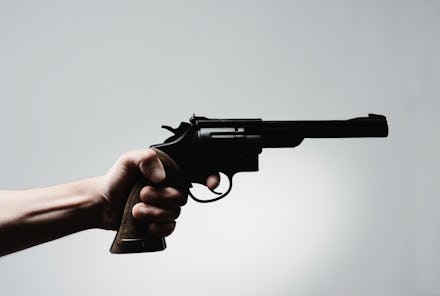Japan Is Showing the Rest of the World How to Deal With Gun Violence

Gunshots set the tempo for one of the most draining rhythms of American life.
Mass shootings, which have been about as consistent as the rise of the sun this year, are a constant source of tragedy and anxiety across the country. Again and again, the United States reacts to mass shootings with a ritualized bout of mourning as critics of the country's gun policies slide into a well-worn cycle of horror, sadness and anger.
One established feature of this cycle is a chart that circulates across the Internet showing how exceptional the U.S. is in the developed world for the frequency of its gun deaths. The chart below shows the rate of homicides by firearms in developed nations. With the exception of Mexico, which is in the midst of a civil war over its illicit drug trade, the U.S. is without rival among its peers:
That chart captures how serious this problem is in the U.S. but it also shows alternatives. Almost all the way at that bottom lies another major country that's almost entirely extinguished gun deaths. It's a highly populated country with a bloody history of warfare, extraordinary technological sophistication and a population that enjoys shooting for sport. Yet in all of 2013, merely 12 people were killed by guns, according to the Washington Post, a number lower than the victim count of a number of recent mass shootings in the U.S.
That country is Japan. Largely because of its very strict gun laws and low gun ownership rate, gun-related homicides are an extreme rarity. On the occasion that there is a spike in homicides — in 2007, the death of 22 people in gun attacks caused great alarm — more rules are often instituted in response to make such gun deaths even more unlikely.
There's a vast array of historical, cultural and political reasons that have landed Japan on the opposite side of the iconic gun chart as the U.S., but it's in no small part because the country holds a very clear view of guns: Guns are a threat to public safety, and gun possession is something to be earned rather than something one is entitled to.
The history: For centuries, Japan has regulated the way that its citizens can own guns. Until World War II, civilians could own a variety of guns, including handguns. But after the war, the Allied powers, led by the U.S., instituted a number of arms control regulations which involved disarming servicemen and collecting guns from the public.
Japan established its own laws generally prohibiting gun possession in 1958, replacing the Allied directive. Since then, those laws have been amended time and time again restricting access to guns further, especially in the wake of surges of gun-related homicides.
People in Japan can own guns. Outside of law enforcement, members of the public can apply for permits for certain guns used for hunting, competitions and specialized research purposes.
But the process to obtain a permit is incredibly rigorous. As the Washington Post reports, there are several steps needed before someone can legally purchase and own a gun in Japan. Applying for a permit requires completing a class on gun laws and safety and passing a written comprehension test. Applicants must fill out a number of forms that document family background and work. They must have a medical certificate that verifies their mental health. They need to undergo a criminal background check. They must go to a full-day training course that involves instruction on handling, and complete a shooting test. Only after doing all this can someone obtain a three-year permit and purchase a gun.
It doesn't end there. As the Washington Post documents, after purchasing a gun, gun owners are expected to register their firearm with a police station. The owner must also provide police with information about where in the home the gun will be stored. Japanese law requires that the gun is stored with a metal chain holding the trigger guard and in a locker secured with three locks.
Violations of gun laws come with extraordinarily strict consequences. Somebody who fires a prohibited firearm is usually committing three crimes: owning the gun, owning the bullets in the gun and firing it. Merely owning a handgun, which is prohibited for all civilians except licensed researchers, is punishable by up to 10 years in prison. Minor, victimless violations by law enforcement officials, such as accidentally firing a gun at a wall, sometimes make national news.
Apples and oranges: Japan and the U.S. are vastly different when it comes to gun laws. As noted in the Atlantic, Japan's legal code is premised on the idea that guns are dangerous and should be kept out of the hands of the public with some closely monitored exceptions. By contrast, the right to bear arms was enshrined into the Constitution.
While over the course of U.S. history the interpretation of that right and how to balance it with public security has varied, for centuries the principle has served gun advocates well in a sprawling frontier society where self-protection and self-governance are woven into the country's fundamental ethos.
There are plenty of other variables that shape gun deaths which can't be explained simply by legal regimes. Japan has a very low crime rate, it is relatively racially homogenous, and people have different attitudes toward the hand of government authority in public life. It's a society whose experience with World War II, which includes being the world's only victim of a nuclear attack, has made it more averse to violence.
In the U.S., a person could argue, plausibly, that with so many guns floating around the country, the only thing that makes him or her feel safe is having one of their own. The Japanese response to that would be that the best way to feel safe is to do what you can to get rid of as many of them as you can.